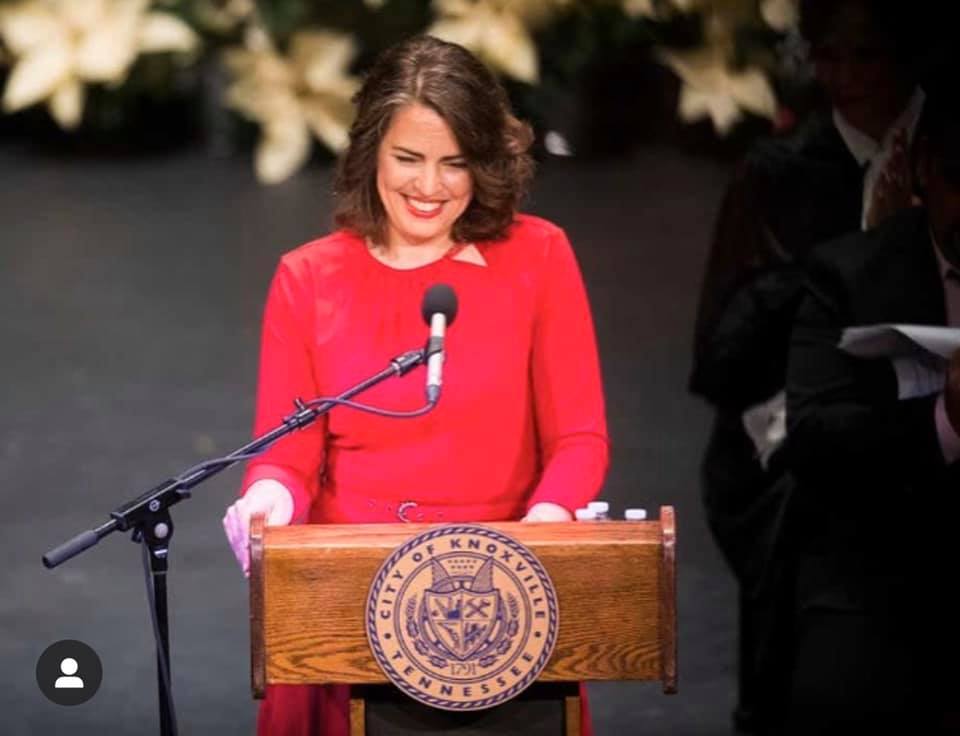Man plans and God laughs – old Yiddish saying.
Most newly-elected presidents, governors or mayors have goals for their first 100 days in office – generally referred to as the “First Hundred Days” to signify that it’s a Real Big Deal. Indya Kincannon had no such list, but says she got to wondering if she needed to get one, so she asked former New York City Mayor Mike Bloomberg about it when he came to Knoxville Jan. 10 to open a presidential campaign headquarters here.
“He said, ‘Don’t worry about the first 100 days milestone. It’s a false deadline. Instead, take time to hire excellent people who will be great members of the team and stay with you the whole time.’”
And that, she says, is exactly what she has done.
“I’m trying to hire (and keep) only people smarter and harder working than me. So far I’m really happy with the group effort.”
Nobody foresaw what was ahead on Dec. 21 when she and four new city council members were sworn into office in front of a big, happy crowd in the Bijou Theater auditorium. The new mayor’s message of hope, inclusion, good jobs and quality housing was well received. The mood was as festive as the holiday season.
Ten days later, the World Health Organization reported that a virulent, deadly pneumonia of unknown origin and with no known cure was ravaging the Chinese city of Wuhan (population 11 million). By the end of January, the WHO declared the new illness a Public Health Emergency of International Concern. On Feb. 10, it had a name: COVID-19.
On March 11, COVID-19 was declared a pandemic.
On March 20 – Kincannon’s 90th day in office – she closed down non-essential businesses like bars, nail and hair salons, sit-down restaurants, gyms and indoor venues large enough to seat 50, pretty much bringing the city’s thriving food and entertainment business to a halt. After some grumbling, Knox County Mayor Glenn Jacobs followed suit with a more lenient order. On March 23, the health department confirmed Knoxville’s first case of COVID-19. By Kincannon’s 100th day, the health department reported more than 60 confirmed cases and one reported death.
She describes the experience as “challenging.”
“We are trying to put together the whole administration, keep track of the goals we talked about during the campaign, fill staffing needs – primarily from retirements – and then the pandemic comes along. I don’t think any elected official was prepared for something of this magnitude,” she said.
“But the good news is I have had a chance to put together most of my team.”
Her team starts with three deputies: David Brace, chief operating officer, and Erin Gill, chief policy officer, are both holdovers from Madeline Rogero’s administration. Brace holds the same position as before; Gill had run Rogero’s Office of Sustainability. The third deputy, former city council member Stephanie Welch, is chief economic and community development officer. She is a major in the Army Reserves and is executive officer for a medical support unit based in Chattanooga. Kincannon said Welch’s expertise is going to come in handy in ways no one could have anticipated.
Director of Communications Kristin Farley (formerly with WATE) is in charge of responding to COVID-19 related issues. Director of Community Empowerment Charles Lomax is staying in touch with neighborhood problems.
And problems abound. The homeless population needs medical care and a place to shelter and isolate. Chip Barry is the city’s COVID-19 liaison and is working with the health department and the county on projects like finding personal protective equipment (PPE) for healthcare workers and first responders.
Kincannon says that even though she’s still a relative rookie, she’s as ready for this challenge as anyone could be.
“One of the necessities is knowledge of how government works. This is a time when public sector experience helps. Quick action has been necessary. It is important to be transparent and know what works and doesn’t work. It’s been a tough transition, but it’s not like I’m coming in starting from scratch. This has been an exercise in communication and cooperation, and those are things I’m good at – What is the goal, and how can we reach this together?
She quoted a local journalist who described her as “Not warm and fuzzy, but frightfully well organized.”
While dealing with these immediate crises, she said she’s thinking ahead.
“We want to set up a response that’s going to help us get through this in the long run. This is a marathon, not a sprint.”
Betty Bean is a veteran reporter for Knox and Sevier counties.

